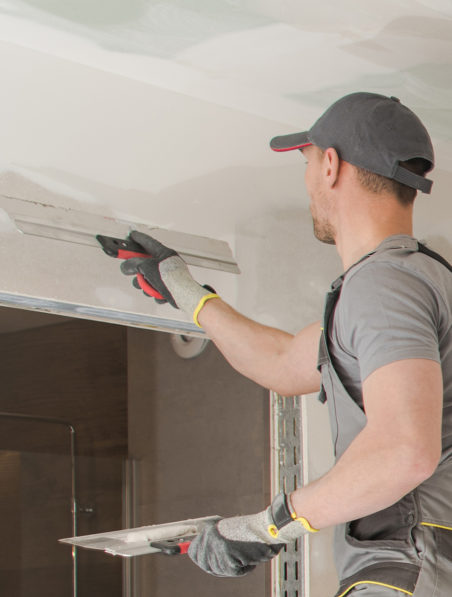Drywall, also called plasterboard or gypsum board, is a typical construction material used for interior walls. Drywall is constructed from a core gypsum plaster sandwiched with two layers of paper, paper, or fiberglass.
Drywall can be easily damaged by doorknobs, furniture or an accidental impact.
Damage from water: Don't expose the drywall to water. It may become affected by mold, discoloration, or warping.
Moving or laying the foundation: This can cause cracks and crevices to the wall.
Ageing: Drywall can be brittle with time, and cracks or holes could appear.
For plumbing and electrical work For new electrical or plumbing work: New plumbing could require holes cut into the drywall.
Drywall repairs usually involve filling cracks or holes with joint compound and sanding. Then painting the area in a manner that matches the surroundings is the final step. In extreme cases the entire wall may require replacement. To prevent further damage to your business or home it is vital to repair the drywall promptly. See the top check this out for drywall calgary contractors for blog recommendations including drywall repair contractors, drywall ceiling contractors near me, best drywall installers near me, drywall experts near me, framing and drywall contractors, drywall installation near me, drywall installation near me, drywallers near me, sheetrock company, drywall services near me and more.

What Can Happen If Drywall Is Damaged And What Can Be Done To Fix It?
The process of repairing drywall includes several steps. The process typically involves framing, insulation, soundproofing, patching, taping, mudding, and painting. Here's a brief overview of the steps involved framing. If the drywall is damaged by structural problems it might be required to fix or replace the framing before the drywall is be restored.
Insulation: After the framing has been installed it is possible that insulation will need to be fitted into the wall cavity. This is especially the case for walls that are exterior, or walls which divide living spaces.
Soundproofing If soundproofing is required, an additional layer can be put in between the framing and drywall. This will help to reduce noise transmission between rooms.
It is necessary to patch any damaged drywall once the insulation framing, soundproofing and framing are completed. This might mean cutting out the damaged section and replacing it with another piece of drywall.
Taping: When you've completed the installation of your new drywall, tap the joints in order to make seamless surfaces. You'll need to put joint compound on the joints and tape the joints.
Apply the joint compound after the tape is put on. It will fill in any holes and smooth out the surface. This could require several coats of joint compound by sanding in between each coat to create a smooth surface.
Painting: When the joint compound has dried it is possible to paint the drywall to match your room. This can take several coats depending on the final finish you want.
While repairs to your drywall can be tedious and time-consuming but they can also be smooth and professional If you pay attention to the details and use proper techniques.

Tips And Advice On Choosing A Drywall Contractor
The right contractor to work with is crucial to ensure that the project will be completed on time, within budget, and to the highest standards. Here are some helpful tips and recommendations for selecting the best drywall company: Ask for recommendations from relatives, friends or acquaintances for recommendations. The best way to find the right contractor is through word-of-mouth recommendations.
Find online reviews of local drywall contractors. These will provide you with an idea of their reputation and also the quality of their work.
Check credentials: Ensure that the contractor you choose is licensed, insured and bondable. This covers you in case you suffer any injuries or damages that occur during the construction.
Request estimates: Request estimates from at least three contractors. This will give you greater understanding of the range of costs and also help to spot warning signs.
Ask questions: You should not be afraid to ask the contractor questions regarding their process, materials, and experience. A reliable contractor will be more than happy to answer any questions you have and provide a detailed explanation of their process.
Be responsive and communicate well A contractor who communicates well and is easy to reach. This will ensure that your project is completed on time and that you are happy with the final results.
Refer to references: Get references from the contractor and follow-up with them. This will help you gain an impression of the contractor's high-quality work as well as professionalism.
With these suggestions to find a drywall contractor that is reliable, experienced, and a good fit for your project.